- Tire Technology Expo 2025
- Tony Robinson
- Deutsche Messe
- Hannover
- Bekaert
- Rockwell Automation
- VMI Group
- HF Group
- ARP Technologies
- Synthos
- Nynas
- Schill+Seilacher “Struktol” GmbH
- Kordsa
- Black Donuts
- Continental
- Bridgestone
- Claire Fiioretti
- European Sustainability Product Regulation
- Rockwell Automation
- Adam McCarthy
- ETRMA
Global Tyre Industry Converges In Hannover For Technology Exhibition
- By TT News
- April 28, 2025

The global tyre industry’s top manufacturers and technology suppliers met at the Tire Technology Expo 2025 in Hannover on 4-6 March to unveil technologies focused on driving sustainability, digitalisation and road safety. At the Deutsche Messe, the exhibition featured advances in tyre engineering, materials science and manufacturing technologies that will define mobility in the future.
In opening the event, expo founder Tony Robinson called on manufacturers to close the knowledge gap with consumers, highlighting how most drivers undervalue the importance of tyres in ensuring a vehicle’s safety. He mentioned that safety rests on the four small ‘footprints’ of rubber linking a car to the road, which tends to be undervalued by the general driver.
Looking to the future, Robinson saw a day when tyres contain sensors that share real-time information with other cars and roadside infrastructure. These sensors could warn drivers of dangerous road conditions like flooding or new potholes, making roads safer and avoiding crashes. He predicted that information from tyres could also feed into weather forecasting services, providing useful real-time information on road conditions.
The exhibition floor showcased innovation and high-performance solutions from more than 240 exhibitors, with Bekaert, Rockwell Automation, VMI Group, HF Group, ARP Technologies, Synthos, Nynas, Schill+Seilacher “Struktol” GmbH, Kordsa, Black Donuts and others.
SUSTAINABILITY AND MATERIAL INNOVATION TAKE CENTRE STAGE
The expo also reflected the tyre industry’s growing focus on sustainability, with manufacturers launching new materials and processes to lower environmental impact. Bekaert launched its Mega Tensile reinforcement technology, a major innovation in its Elyta range. The technology enables tyre manufacturers to produce up to 20 percent less steel and 10 percent less rubber compound in belt plies, achieving a 2-4 percent drop in rolling resistance and a huge 15-20 percent reduction in CO₂ emissions per tyre.
Kordsa introduced its REV Technologies, which are specifically tailored to electric vehicle tyres. The company’s innovations include recycled PET (rPET) cord fabric and RFID tyre tags, enabling improved lifecycle monitoring and data collection. Kordsa expects to enhance sustainability and recycling practices by combining digital identification with tyre production.
Teijin Aramid featured its Twaron para-aramid reinforcement, a material that can manufacture lighter tyres with reduced rolling resistance and eventually lower emissions.
EV AND DIGITAL INNOVATION LEAD DISCUSSIONS
As the electric vehicle (EV) market grows, tyre makers focus on creating solutions specific to the special needs of EVs and autonomous vehicles. Continental Tires unveiled an overall sustainability strategy, emphasising the environmental impact of tyres throughout their life cycle. The firm detailed plans to incorporate more sustainable raw materials, minimise waste during production and enhance tyre durability.
Michelin’s Director of Standards and Regulations for Connected Mobility, Claire Fioretti, outlined the company’s efforts around Digital Product Passports (DPP), a major initiative within the 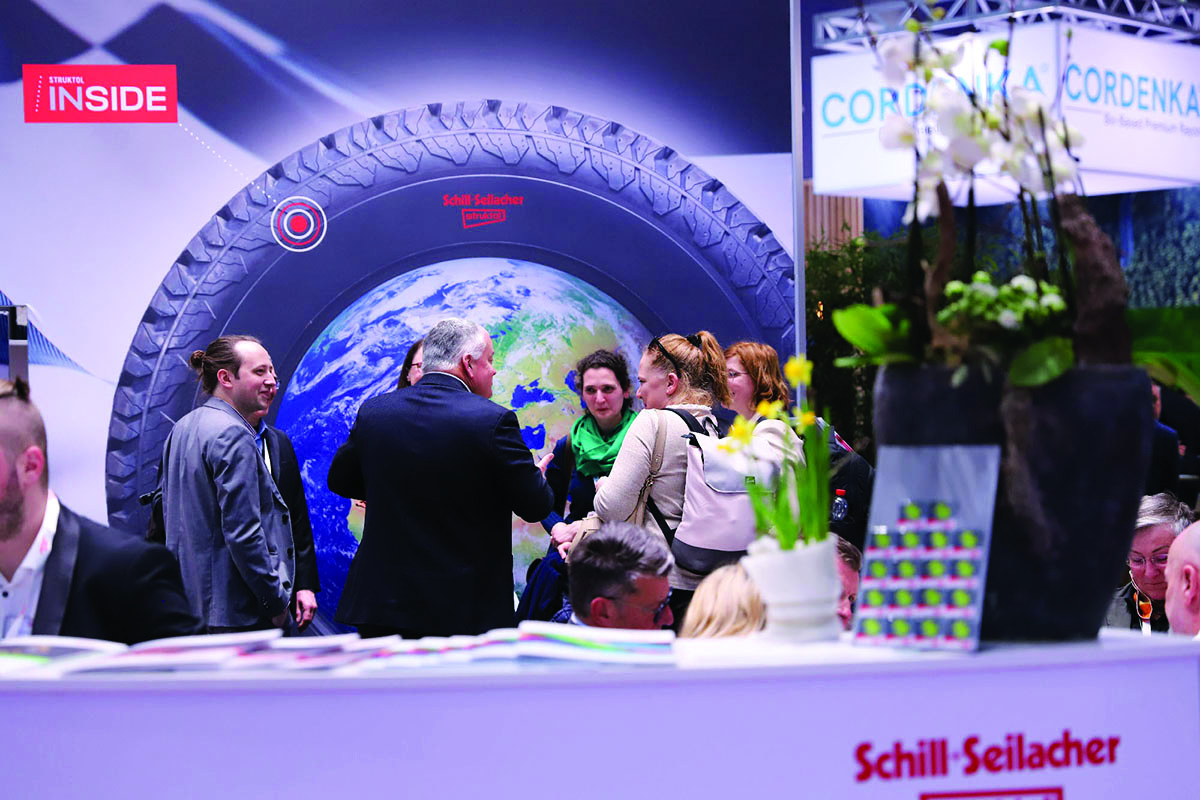 (ESPR). The regulation, enacted in 2024, aims to increase supply chain transparency by mandating that products carry a permanent, readable identifier usable throughout their life cycle. Michelin is already testing the programme in various industries, such as textiles, electronics and automotive components, with the cooperation of French, German and Swedish stakeholders.
(ESPR). The regulation, enacted in 2024, aims to increase supply chain transparency by mandating that products carry a permanent, readable identifier usable throughout their life cycle. Michelin is already testing the programme in various industries, such as textiles, electronics and automotive components, with the cooperation of French, German and Swedish stakeholders.
The ESPR system, Fioretti characterised as an ‘ambitious information system’, will enable the maker, the recycler and the buyer to make environmentally informed decisions. She stressed that the movement is not so much about compliance as a transition towards the principles of the circular economy. By 2027, by the time broad adoption of the ESPR sets in, product design may improve, recycling efficiency will be elevated and buyers’ confidence will be boosted in second-hand markets.
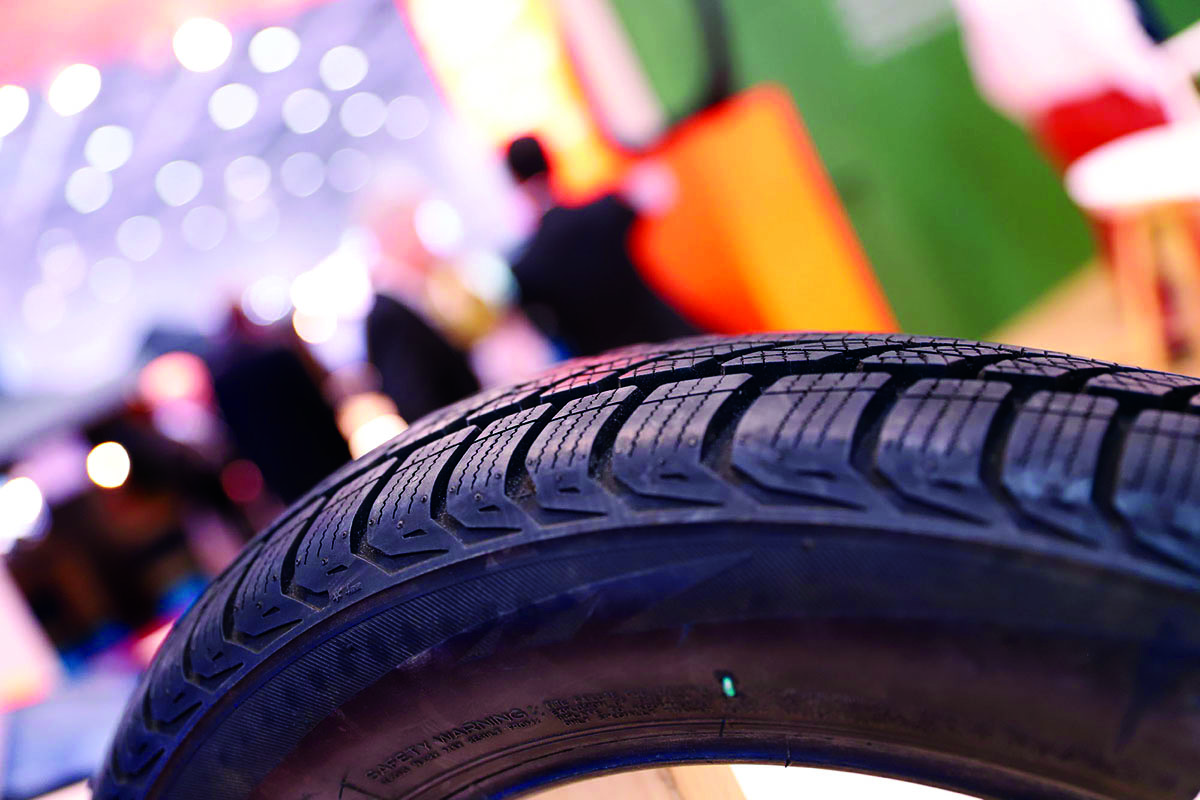
MANUFACTURING INNOVATION AND AI TECHNOLOGY
The event showcased the latest digital manufacturing solutions to enhance efficiency, lower waste and better quality control. Rockwell Automation launched AI-driven tools to optimise tyre production, including digital thread technologies for tracking data without interruption through various manufacturing processes.
Black Donuts launched its Digital Twin Tyre Plant Simulation, a cutting-edge real-time virtual modelling tool that aids manufacturers in minimising downtime and optimising production. The company’s methodology involves end-to-end finite element analysis, enabling accurate tyre performance simulations before production.
HF dominated the manufacturing technology market with its state-of-the-art electric tyre curing presses. The company illustrated how its new electric curing technology could be applied to new and retrofit installations to minimise energy consumption and enhance process efficiency. Fischer TireTech exhibited computerised cord-cutting lines and premium extrusion technologies aimed at increasing accuracy in tyre production.
Uzer Makina launched a high-end electric tyre curing press focused on energy efficiency and precision production. ARP Technologies showcased its Electromagnetic Heating (EMH) curing system, a more energy-efficient curing process, alongside an artificial intelligence-based inspection machine that can spot tiny defects with great accuracy.
KraussMaffei featured its multiplex extrusion technology, which enhances first-time production quality and eliminates material bleeding during tyre formation. The company showed a new head clamping technology that maximises channel cleaning effectiveness, further expanding the limits of green manufacturing.
REGULATORY DEVELOPMENTS AND ENVIRONMENTAL CONSIDERATIONS
Regulatory matters were on the agenda at the expo, with leading experts discussing the changing scene for tyre production and green compliance. Adam McCarthy, Secretary General of the European Tyre and Rubber Manufacturers’ Association (ETRMA), gave a definitive overview of recent European Commission regulatory interventions impacting the sector.
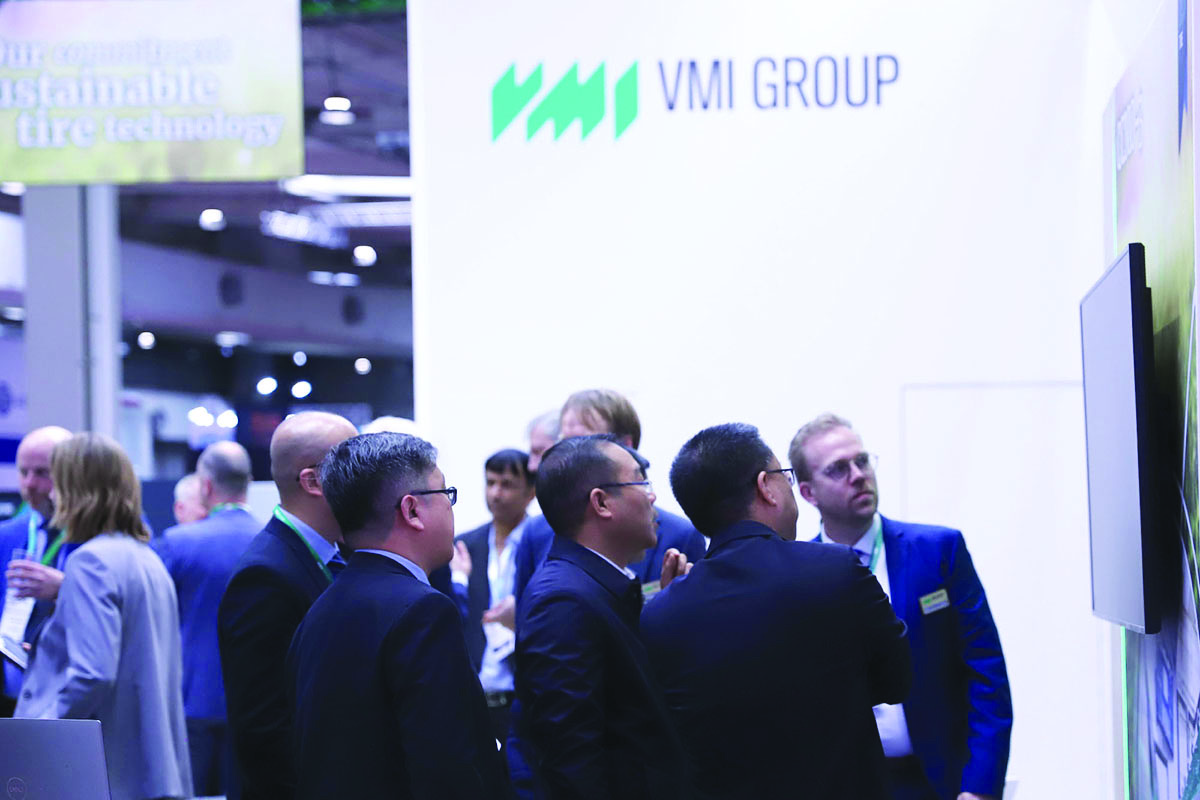 A specific session on Tyre and Road Wear Particles (TRWP) collaborated with industry experts from Bridgestone, Continental and Michelin, as well as leading research institutions, to address the implications of future Euro 7 regulations. It was centred around reducing tyre wear’s environmental footprint without compromising performance levels.
A specific session on Tyre and Road Wear Particles (TRWP) collaborated with industry experts from Bridgestone, Continental and Michelin, as well as leading research institutions, to address the implications of future Euro 7 regulations. It was centred around reducing tyre wear’s environmental footprint without compromising performance levels.
FUTURE OUTLOOK AND INDUSTRY COLLABORATION
During the three-day conference, experts worldwide exchanged information, delved into future technologies and worked on crafting the mobility of the future. The event highlighted reducing carbon footprint, improving safety and customising solutions for future electric and self-driving cars.
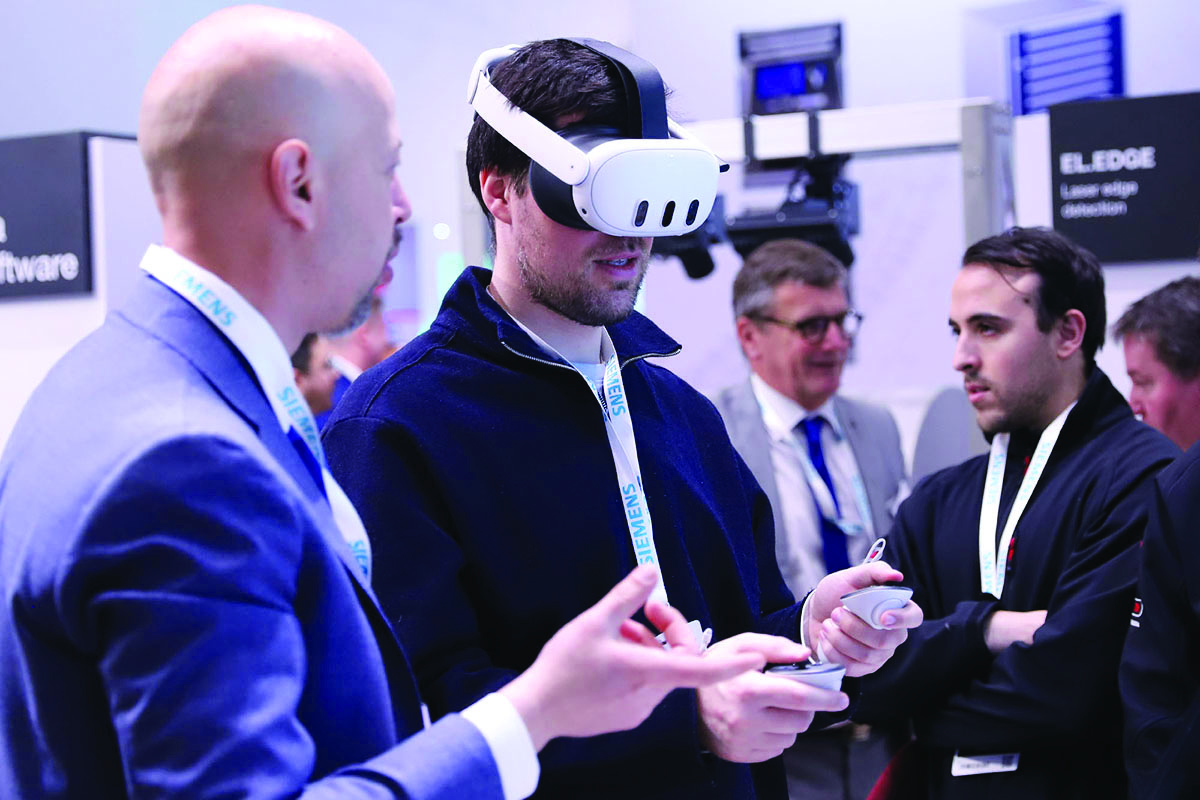
The next edition will be held on 3 and 4 March 2026.
TIRE TECHNOLOGY INTERNATIONAL AWARDS FOR INNOVATION AND EXCELLENCE
A key highlight of the event was the prestigious Tire Technology International Awards for Innovation and Excellence 2025. Recognising achievements across 12 categories, the awards celebrate the latest advancements in tyre technology, progress towards a more sustainable industry and the outstanding contributions of individuals driving innovation. This year’s winners are as follows:
Goodyear bagged Environmental Achievement of the Year – Tire Design for its ElectricDrive Sustainable- Material (EDS) tyre.
Continental was awarded the Environmental Achievement of the Year – Manufacturing award for its CO2-neutral tyre production at the Lousado plant in Portugal.
Nokian Tyres won the Environmental Achievement – Industry Contribution award for its inauguration of the world’s first full-scale tyre factory with zero CO2 emissions in Oradea, Romania.
Bekaert received the Materials Innovation of the Year award for its next-generation reinforcement solution, Mega Tensile.
Sumitomo Rubber Industries won the R&D Breakthrough of the Year award for its Active Tread technology.
VMI was awarded for Tire Manufacturing Innovation of the Year award for its integrated quality monitoring for the MAXX and MILEXX platforms.
ARP Technologies was selected as Industry Supplier of the Year for its many innovations in the tyre curing sector.
Bridgestone bagged Tire Concept of the Year for its Lunar concept tyre.
Michelin was awarded Tire of the Year for its Primacy 5 tyre.
Continental won the Tire Manufacturer of the Year award for the fourth time, acknowledging the scale and breadth of the company’s achievements over the last year.
Two further awards were also given for individual achievements in the industry:
Katerina Filzer, a PhD student at Twente University in the Netherlands, was awarded the 2025 Young Scientist Award for her presentation, ‘An Innovative Method to Incorporate a Devulcanization Aid into Rubber’.
Anke Blume, head of elastomer technology and engineering at the University of Twente, received the Lifetime Achievement Award for her outstanding contributions to the tyre industry.
KraussMaffei Technologies Appoints Dirk Musser As New Managing Director
- By TT News
- February 27, 2026

KraussMaffei Group is set to implement a leadership transition at its subsidiary, KraussMaffei Technologies, with a change at the board level. Jörg Stech, who has served as Chairman of the Board and global head of injection moulding, automation and additive manufacturing since 2023, will be departing on 31 March 2026 at his own request. He will be succeeded by Dirk Musser, the current Head of Group Transformation at the parent company, who has been appointed as the new Managing Director effective 1 April 2026. The leadership handover between Stech and Musser is already in progress, ensuring a seamless transition.
Stech’s tenure unfolded during a difficult economic period marked by financial losses and a contracting market. He responded with decisive measures aimed at margin enhancement and balance sheet improvement, which laid the groundwork for the company's long-term stability. Under his direction, the product lineup for injection moulding and automation was revitalised with the introduction of the LRXplus linear robot, the fully electric PX series and the MC7 control system, all launched in late 2025 alongside new artificial intelligence tools. He also launched a multi-year development initiative and pushed the company into new markets, such as aerospace and drone technology, by leveraging expertise in specialised processes like ColorForm. Through a focus on operational excellence, pricing discipline and capital efficiency, Stech guided the company to a significantly more resilient position compared to three years prior, despite the persistent downturn in injection moulding.
Musser brings to his new role extensive experience in transformation and finance. In his current capacity, he has already been closely involved with KraussMaffei Technologies, collaborating with its leadership to drive strategic initiatives and enhance operational performance. His qualifications include sharp analytical abilities, a strong grasp of industrial processes and a broad international perspective. An economist by training, Musser has accumulated over 20 years of leadership experience across various technology and industrial sectors. His background includes leading major transformation and turnaround projects at CRRC New Material Technologies, where he stabilised plant earnings in North America, as well as directing operational and financial restructurings during his time at Deloitte. He has also held roles with P&L responsibility, managing global supply chains and post-merger integrations at CRONIMET and has prior experience with automotive manufacturers including Daimler and Fujian Benz Automotive in China.
Alex Li, CEO, KraussMaffei Group, said, "Jörg Stech took on responsibility in a difficult situation, set clear priorities and launched decisive initiatives. The successful market launch of the LRXplus linear robot and the all-electric PX machine series, the consistent focus on profitability and the sustainable strengthening of our balance sheet are visible results of this work. We would like to express our sincere thanks to Jörg Stech for his leadership, integrity and team spirit. We value Dirk Musser as a leader who combines strategic clarity with operational excellence. In a short period of time, he has provided vital impetus for the transformation of the group and impresses with his analytical strength, decisiveness and deep understanding of our processes – not least through his successful collaboration with the managing directors of KraussMaffei Technologies. We are convinced that he will continue on this path with clarity and creative drive to successfully align KraussMaffei Technologies."
Stech said, "After many years in an environment full of technological, economic and geopolitical challenges, I look back with great gratitude on a time in which I was always surrounded by an exceptional workforce. Together, we achieved things that many initially thought were impossible. This cooperation, this willingness to push boundaries and create something new, was a joy for me. My special thanks go to all stakeholders in the company and, of course, to all employees. I leave with respect, gratitude and the conviction that this long-established company will continue to achieve great things in the future."
Musser said, "Together with my fellow managing directors Dr Frank Szimmat and Markus Bauer, I want to resolutely drive forward the further development of KraussMaffei Technologies. Our focus is on further expanding stability and performance and taking the necessary steps to successfully position the company in a dynamic market environment. I look forward to shaping this path together with our teams.”
Dario Marrafuschi Succeeds Mario Isola As Pirelli’s Head Of Motorsport
- By TT News
- February 27, 2026

Italian tyre manufacturer Pirelli has announced that Dario Marrafuschi will become the Head of its Motorsport Business Unit, effective 1 March. He succeeds Mario Isola, who will remain with the company until 1 July to assist with the leadership transition.
Marrafuschi joined Pirelli in 2008 and has held positions within the Formula 1 Research and Development department. Most recently, he led the development of the company's road products.
He will report to Giovanni Tronchetti Provera, Executive Vice-President of Sustainability, New Mobility & Motorsport. The appointment comes as the company continues its role as the tyre supplier for various global motorsport categories.
Isola departs the company following a tenure that included the expansion of Pirelli’s motorsport operations. The company stated that Isola will pursue other professional opportunities following his departure in July.
Changing Tyre Dynamics In A Changing Car Market
- By Sharad Matade
- February 27, 2026
For Continental Tires India, the passenger vehicle market in India is entering a phase where scale and structure are finally aligning with its longstanding premium ambitions. Passenger vehicle sales reached a record 4.3 million units in 2024, expanding by 4–5 percent year on year, but it is the composition of that growth – rather than the headline volume – that is reshaping the company’s strategy. Utility vehicles now account for approximately 58 percent of total passenger vehicle sales, up sharply from about 51 percent the previous year, cementing SUVs and crossovers as the dominant force in the market.
This structural shift has direct consequences for tyre manufacturers operating at the upper end of the value spectrum. Larger vehicles bring higher kerb weights, bigger wheel diameters and greater expectations around refinement, safety and performance. For Continental, the change represents not merely an increase in addressable demand but a decisive move towards tyre categories where technology differentiation and pricing discipline can coexist.
Samir Gupta, Managing Director of Continental Tires India, calls this phase a turning point, not a temporary high. He says the surge in utility vehicles – driven by electrification and more premium cars – fundamentally changes the economics of the passenger tyre market in India.
“Let me clarify one thing first. The utility vehicle segment is no longer small. Last year, around 60 percent of passenger vehicles sold in India were utility vehicles, and including first-time buyers upgrading within this segment, the share goes beyond 65 percent,” Gupta says.

Industry data broadly supports this assessment. SUVs alone contributed close to three-fifths of all passenger vehicle sales in 2024, with compact utility vehicles accounting for a significant share of incremental volumes. The overall passenger vehicle market, at around 4.3 million units, has thus become structurally skewed towards larger formats – an inflection with long-term implications for tyre sizing, load ratings and product mix.
This shift shows in replacement demand. As vehicle footprints grow, rim diameters are increasing. “The market is clearly moving from smaller to bigger rim sizes. Demand for 17-inch and above tyres is rising sharply,” Gupta says. While these tyres are still a minority, their growth far outpaces the overall passenger tyre market.
Electrification is accelerating the shift. A substantial proportion of electric passenger vehicles sold in India today are SUVs, and Continental expects EVs to account for more than 50 percent of the passenger vehicle segment within five years. For tyre manufacturers, this creates new technical requirements – higher torque tolerance, lower rolling resistance and stringent noise control. “That creates a significant opportunity for us because our strengths lie in premium, high-performance tyres,” Gupta says.
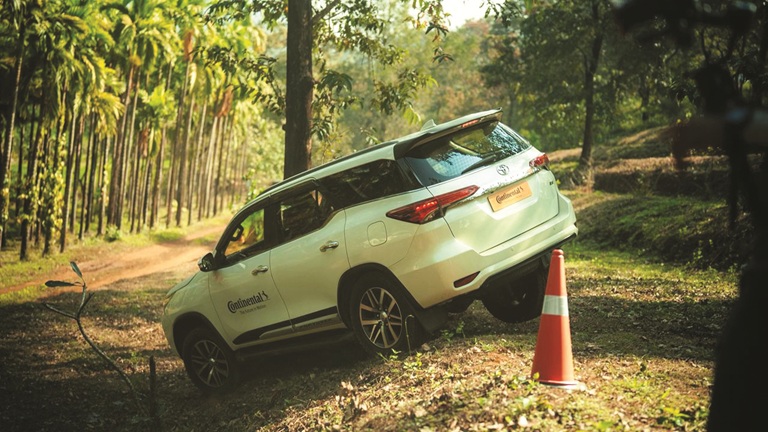
Despite these favourable structural trends, premium tyres have historically struggled to gain traction in India. For much of the past decade, the market remained intensely price-sensitive, with tyres treated largely as commoditised replacement items. Continental’s response, Gupta explains, has been consistent rather than tactical pricing. “Right from the beginning, we have focused on fair pricing. The idea is simple – if we can clearly differentiate on performance and consistently deliver on those promises, price recovery will follow,” he explains.
The broader environment is now becoming more supportive. As vehicle prices rise and consumers migrate towards larger, more sophisticated vehicles, willingness to spend on tyres that enhance safety, comfort and driving confidence is increasing. This trend is also evident at the top end of the market. Premium and luxury passenger vehicle sales reached approximately 51,500 units in 2024, up around 6 percent year on year and crossing the 50,000-unit threshold for the first time – a symbolic marker of premium consumption in India.
Gupta sees premiumisation extending beyond luxury vehicles. “Earlier, India was extremely price-sensitive, but that is changing in higher segments. Consumers are upgrading vehicles and are more willing to invest in tyres that enhance safety, comfort and confidence,” he says.
The intensification of competition, with global premium tyre brands expanding or re-entering India, is viewed as a positive development. “Competition is always good,” Gupta says. “It gives you room to grow and improve.” More importantly, he believes it will help reframe the market. “More premium players will help move the market away from being purely cost-driven to being value-driven,” he adds.
Replacement market dynamics reinforce this view. Of the roughly 32–33 million passenger tyres replaced annually in India, tyres sized 17 inches and above account for about 12–13 percent. While the overall replacement market grows at 5–6 percent per year, this high-diameter segment is expanding at over 20 percent annually, closely tracking the shift in new vehicle sales.
This sharper focus on passenger tyres also explains Continental’s decision to exit the truck and bus radial segment in India. Gupta stresses that the decision was strategic rather than operational. Continental entered the TBR market in 2014, invested significantly and received strong feedback on product performance.
However, the economics proved limiting. Gupta says, “TBR in India is largely a B2B, fit-for-purpose market. Even if you have the best tyre, willingness to pay remains limited because fleet operators are under constant margin pressure.” Although commercial tyres offer higher absolute margins per unit, they consume substantially more raw material. “One commercial tyre uses six to eight times the raw material of a car tyre. Percentage margins are actually higher in passenger tyres,” Gupta explains.
After reviewing its portfolio, Continental chose focus over breadth. Exiting TBR allows the company to concentrate capital, technology and management attention on passenger and light truck tyres, where differentiation is more readily monetised. Gupta rejects the idea that a narrower portfolio weakens the company’s position. Commercial and passenger tyre customers, he argues, are fundamentally different – one driven by procurement economics, the other by consumer perception and emotion.
Indian consumers, Gupta believes, are becoming more tyre-aware. “Premiumisation is happening across the vehicle industry, not just in tyres. As consumers move to larger and more premium cars, their expectations also rise,” he says. Where tyres were once treated as an afterthought, buyers increasingly recognise their role in braking, grip, noise and overall driving confidence.
This change is evident at the retail level. Continental now operates more than 200 brand stores across India, and feedback from retail partners suggests customers are more informed and more demanding. Availability remains critical. “There is no point launching premium tyres if customers cannot find them,” Gupta says.
To support future demand, Continental is investing around INR 1 billion at its Modipuram plant, with the focus squarely on passenger and light truck tyres. The expansion will extend manufacturing capability from the current 20-inch limit to 22–23 inches, aligning local production with emerging vehicle trends.
Localisation, Gupta argues, is about adaptation rather than compromise. Indian road conditions, climate and driving habits require specific tuning without diluting global performance standards. Education and availability remain the principal challenges.
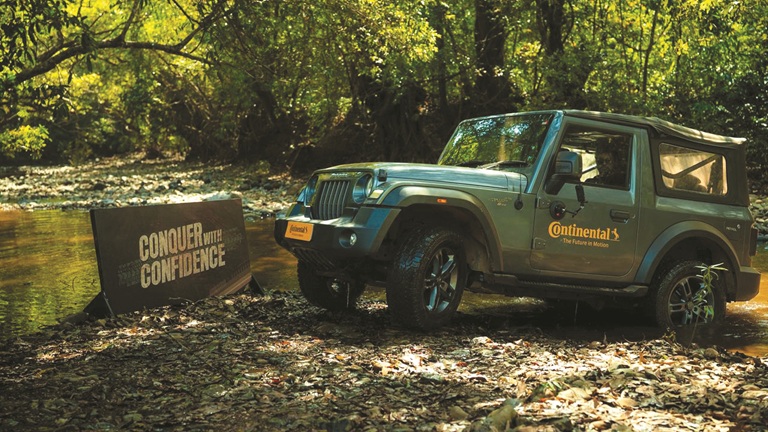
The recent launch of the CrossContact A/T² in India reflects this strategy. Introduced during Continental’s Track Day at Dot Goa 4x4, the product positions India among the early global markets for the tyre. “The first thing you notice is noise – or the lack of it,” Gupta says. “You hear the air-conditioning, not the tyre.” Ride comfort, grip and consistency across terrains define its appeal. As Gupta puts it, “Jahan tak soch jaati hai, wahan tak yeh tyre kaam karta hai.”
Looking ahead, Continental remains largely insulated from shifts in original equipment strategies, such as the gradual removal of spare tyres. Improved carcass design and stronger sidewalls are reducing puncture risk, but the company’s primary focus remains the replacement market.
For Gupta, the question is no longer whether India is ready for premium tyres, but how effectively manufacturers execute. “The market is finally ready for premium tyres,” he concludes. With passenger vehicle sales at record levels, SUVs firmly dominant and premium consumption expanding, Continental believes it is well positioned to grow alongside India’s evolving mobility landscape.
Falken Tyre Europe GmbH Rebrands As DUNLOP Tyre Europe GmbH
- By TT News
- February 26, 2026

Falken Tyre Europe GmbH has officially transitioned to operating under the name DUNLOP Tyre Europe GmbH, following its formal registration with the Offenbach Local Court. This change signifies a pivotal development for the Sumitomo Rubber Industries subsidiary. The rebranding represents a calculated and essential move to establish a more formidable European footprint for the DUNLOP brand. Company leadership acknowledges that this evolution is built upon the considerable equity established by Falken, including its strong market recognition, unwavering product quality and the commitment of its personnel.
This strategic shift positions the organisation under the umbrella of a globally respected marque, with its future strategy firmly centred on expansion, pioneering advancements and ecological responsibility. A prominent symbol of this new chapter will be unveiled shortly, with the renaming of the DUNLOP City Tower in Offenbach. A formal ceremony will mark the occasion, featuring the presentation of the DUNLOP logo at the tower. The event is set to be attended by Offenbach's Lord Mayor, Dr Felix Schwenke, alongside the company’s managing directors, Hiroshi Hamada and Markus Bögner, and the newly enlarged DUNLOP team.
Markus Bögner, Managing Director and President, DUNLOP Tyre Europe GmbH, said, “The name change is an important milestone of which we can be very proud. It strengthens our identity and underlines that we are ready for the next steps. Our strong heritage with Falken is and remains part of our success, laying the foundations for DUNLOP’s future in Europe. Our thanks go to all our employees and partners who have supported and accompanied us on this journey.”







Comments (0)
ADD COMMENT